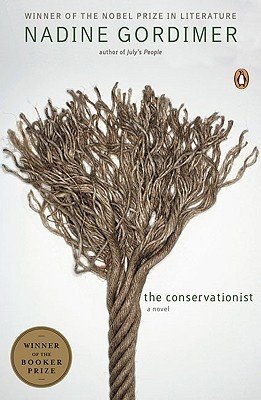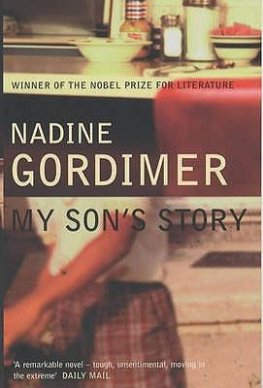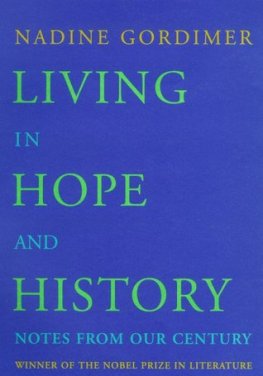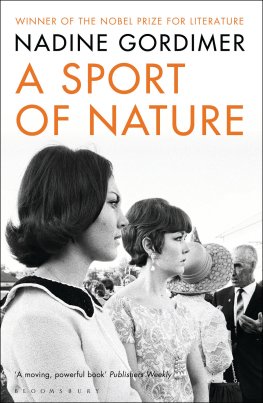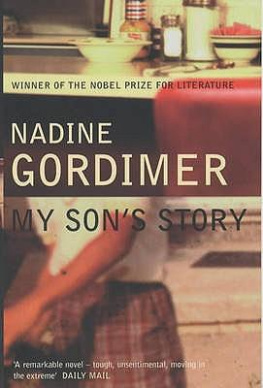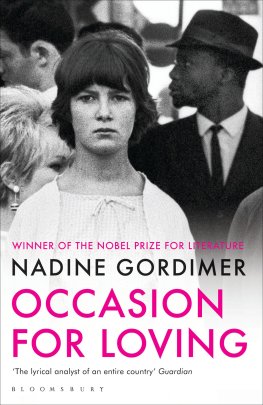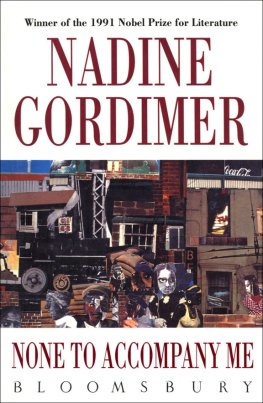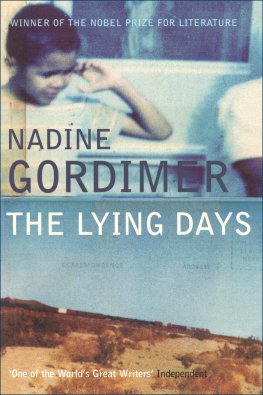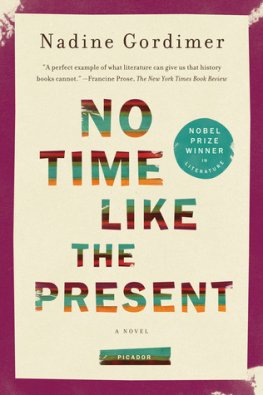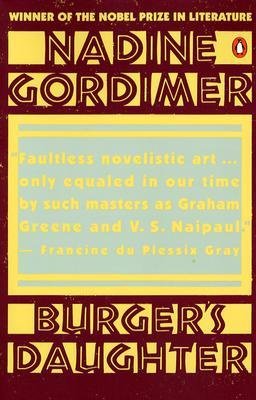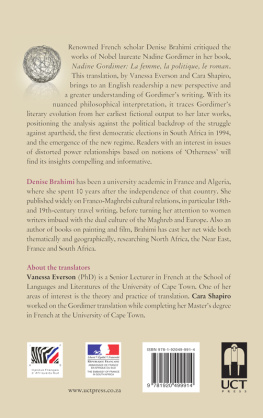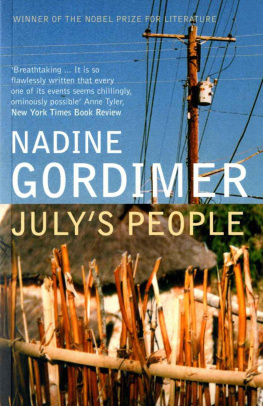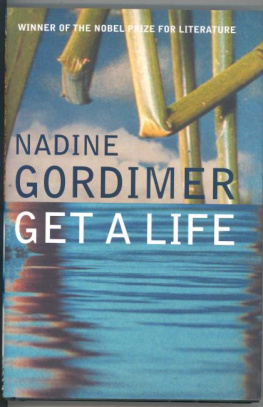Nadine Gordimer - The Conservationist
Here you can read online Nadine Gordimer - The Conservationist full text of the book (entire story) in english for free. Download pdf and epub, get meaning, cover and reviews about this ebook. year: 1983, publisher: Penguin Books, genre: Prose. Description of the work, (preface) as well as reviews are available. Best literature library LitArk.com created for fans of good reading and offers a wide selection of genres:
Romance novel
Science fiction
Adventure
Detective
Science
History
Home and family
Prose
Art
Politics
Computer
Non-fiction
Religion
Business
Children
Humor
Choose a favorite category and find really read worthwhile books. Enjoy immersion in the world of imagination, feel the emotions of the characters or learn something new for yourself, make an fascinating discovery.
- Book:The Conservationist
- Author:
- Publisher:Penguin Books
- Genre:
- Year:1983
- Rating:4 / 5
- Favourites:Add to favourites
- Your mark:
- 80
- 1
- 2
- 3
- 4
- 5
The Conservationist: summary, description and annotation
We offer to read an annotation, description, summary or preface (depends on what the author of the book "The Conservationist" wrote himself). If you haven't found the necessary information about the book — write in the comments, we will try to find it.
The Conservationist — read online for free the complete book (whole text) full work
Below is the text of the book, divided by pages. System saving the place of the last page read, allows you to conveniently read the book "The Conservationist" online for free, without having to search again every time where you left off. Put a bookmark, and you can go to the page where you finished reading at any time.
Font size:
Interval:
Bookmark:
Nadine Gordimer
The Conservationist
I must have been almost crazy to start out alone like that on my bicycle pedalling into the tropics carrying a medicine for which no one had found the disease and hoping I would make it in time
I passed through a paper village under glass where the explorers first found silence and taught it to speak where old men were sitting in front of their houses killing sand without mercy brothers I shouted to them tell me who moved the river where can I find a good place to drown
Richard Shelton,The Tattooed DesertAcknowledgements
Prose quotations are from the Reverend Henry Callaways The Religious System of the Amazulu, dealing with Unkulunkulu, or the Tradition of Creation; Amatonga, or Ancestor worship; Izinyanga Zokubula, or Divination; and Abatakato, or Medical Magic and Witchcraft, originally published by the Springdale Mission Press. Acknowledgements are made to the facsimile edition published by C. Struik (Pty) Ltd, Cape Town, 1970.
Acknowledgements are made to Richard Shelton for permission to quote part of his poem The Tattooed Desert, first published in The New Yorker Magazine, copyright The New Yorker Magazine, Inc., 1970, and subsequently included in Mr Sheltons collection of poetry, The Tattooed Desert, University of Pittsburgh Press, 1971.
~ ~ ~
Pale freckled eggs.
Swaying over the ruts to the gate of the third pasture, Sunday morning, the owner of the farm suddenly sees: a clutch of pale freckled eggs set out before a half-circle of children. Some are squatting; the one directly behind the eggs is cross-legged, like a vendor in a market. There is pride of ownership in that grin lifted shyly to the farmers gaze. The eggs are arranged like marbles, the other children crowd round but you can tell they are not allowed to touch unless the cross-legged one gives permission. The bare soles, the backsides of the children have flattened a nest in the long dead grass for both eggs and children.
The emblem on the cars bonnet, itself made in the shape of a prismatic flash, scores his vision with a vertical-horizontal sword of dazzle. This is the place at which a child always appears, even if none has been in sight, racing across the field to open the gate for the car. But today the farmer puts on the brake, leaves the engine running and gets out. One very young boy, wearing a jersey made long ago for much longer arms but too short to cover a naked belly, runs to the gate and stands there. The others all smile proudly round the eggs. The cross-legged one (wearing a womans dress, but it may be a boy) puts out his hands over the eggs and gently shuffles them a little closer together, letting a couple of the outer ones roll back into his palms. The eggs are a creamy buff, thick-shelled, their glaze pored and lightly speckled, their shape more pointed than a hens, and the palms of the small black hands are translucent-looking apricot-pink. There is no sound but awed, snuffling breathing through snotty noses.
He asks a question of the cross-legged one and there are giggles. He points down at the eggs but does not touch them, and asks again. The children dont understand the language. He goes on talking with many gestures. The cross-legged child puts its head on one side, smiling as if under the weight of praise, and cups one of the eggs from hand to hand.
Eleven pale freckled eggs. A whole clutch of guinea fowl eggs.
The baby at the gate is still waiting. The farmer goes back to the car, switches off the ignition, and walks away in the direction he has driven from. He has left the road and struck out across the veld, leaping the dry donga to land with a springy crackle on dead cosmos and khaki-weed that bordered it last summer. Over the hard ground his thick rubber soles scuff worn scrubbing-brushes of closely-grazed dead grass. He is making for the compound; it is up beside the special paddock where the calves are kept at night. But the neat enclosure with oil drums cut in two to make feed troughs is empty; no one is about. From a line of rooms built of grey breeze-blocks the sound of radio music winds like audible smoke in the clean fine morning: its Sunday. A woman appears from behind the lean-tos of wire and tin that obscure or are part of the habitations. When she sees him approach, she stands quite still, one of those figures with the sun in its eyes caught in a photograph. He asks where the chief herdsman is. Without moving, but grimacing as if she strains to hear, she makes an assenting noise and then answers. He repeats what she has said, to be sure, and she repeats the assenting noise, long and reassuring, like the grunting sigh of a satisfied sleeper. Her gaze steers his back in the direction she has indicated.
He is crossing a lucerne field. The last late cutting of autumn must have been made some time that week; although the shrivelled scraps that remain (dirt-rolls rubbed between finger and thumb, or bits of bust balloon) have lost their clover-shapes and faded to grey-green, underfoot they give out now and then a sweetish whiff of summer breath from the mouth of a cow, or the mouth of a warm sleepy woman turned to in the morning. Involuntarily he draws it deep into his lungs and it disappears into a keener pleasure, the dry, cool and perfect air of a high-veld autumn which, shut up in the car that carried with it the shallow breath of the city, he has not yet taken. Not this morning, not for a week. As the air plunges in him, his gaze widens and sweeps: down along the river the willows have gone blond, not yet at their palest, combed out into bare strands, but still lightly spattered and delicately streaked with yellowed leaves. Around them is a slight smudgy ambience, a mauvish-smoky blend between their outline and the bright air
A whole clutch of guinea fowl eggs. Eleven. Soon there will be nothing left. In the country. The continent. The oceans, the sky.
Suddenly he sees the figure of the black man, Jacobus, making for him. He must have come out of the mealies on the other side of the road beyond the lucerne and is lunging across the field with the particular stiff-hipped hobble of a man who would be running if he were younger. But its he whos looking for Jacobus; theres a mistake somewhere how could the man know already that he is wanted? Some semaphore from the kraal? The farmer gives himself a little impatient, almost embarrassed snigger and continues his own progress, measuredly, resisting the impulse to flag the man down with a wave of the hand, preparing in his mind what to say about the guinea fowl.
Although it is Sunday Jacobus is wearing the blue overalls supplied him and although there has been no rain and none can be expected for five months, he has on the rubber boots meant for wet weather. Hes panting, naturally; but stops, as if there were a line drawn there, ten feet away from the farmer, and goes through the formalities of greeting, which include a hand-movement as if he had a hat to remove. The farmer approaches unhurriedly. - Jacobus, I was coming to find you. Hows everything?
No everything its all right. One calf hes borned Friday. But I try to phone you, yesterday night
Good, thats from the red cow, eh?
No, the red cows shes not ready. This from that young one, that ones you buy last year from Pietersburg
Each is talking fast, in the manner of a man who has something he wants to get on to say. There is a moments pause to avoid collision; but of course the right of way is the farmers.
Look, Jacobus, Ive just been down at the third pasture, there
Im try, try to phone last night, master
But he has in his mind just exactly how to put it: The children are taking guinea fowl eggs to play with. They mustve found a nest somewhere in the grass or the reeds and theyve taken the eggs. -
Font size:
Interval:
Bookmark:
Similar books «The Conservationist»
Look at similar books to The Conservationist. We have selected literature similar in name and meaning in the hope of providing readers with more options to find new, interesting, not yet read works.
Discussion, reviews of the book The Conservationist and just readers' own opinions. Leave your comments, write what you think about the work, its meaning or the main characters. Specify what exactly you liked and what you didn't like, and why you think so.

